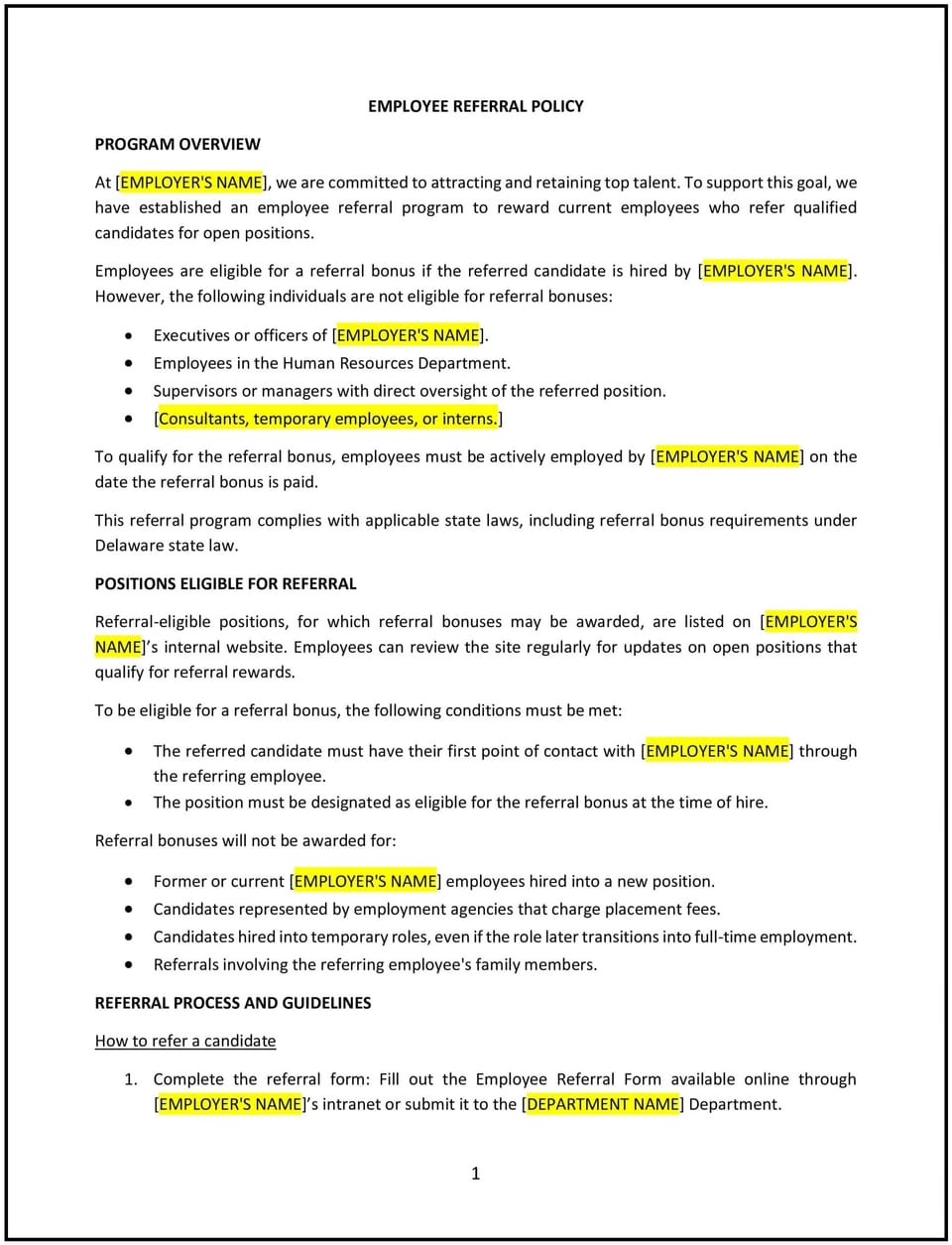Employee referral policy (Delaware): Free template

Employee referral policy (Delaware)
An employee referral policy helps Delaware businesses encourage employees to recommend qualified candidates for open positions. This policy outlines eligibility criteria, referral procedures, rewards, and guidelines to ensure the referral process aligns with company goals and Delaware employment laws.
By implementing this policy, businesses can enhance recruitment efforts, foster employee engagement, and attract high-quality talent.
How to use this employee referral policy (Delaware)
- Define eligible positions: Specify which roles are eligible for referrals, such as full-time, part-time, or specific job categories.
- Outline the referral process: Provide clear instructions for employees to submit referrals, including the required information and submission channels.
- Specify reward criteria: Explain how referral rewards will be issued, including eligibility conditions (e.g., candidate hiring and successful completion of a probationary period).
- Ensure fairness: Emphasize that all referred candidates will go through the standard recruitment process to maintain equal opportunity practices.
- Communicate timelines: Indicate when employees can expect to receive referral rewards after the referred candidate meets the eligibility criteria.
- Track referrals: Maintain a record of referrals to monitor program effectiveness and ensure compliance with company policies.
Benefits of using this employee referral policy (Delaware)
This policy offers several benefits for Delaware businesses:
- Improves recruitment: Leverages employees’ networks to attract high-quality candidates who align with company values.
- Enhances employee engagement: Rewards employees for contributing to the company’s success by referring suitable candidates.
- Reduces hiring costs: Saves on recruitment expenses by sourcing candidates through employee referrals.
- Strengthens workplace culture: Encourages teamwork and employee involvement in building the company’s talent pool.
- Ensures compliance: Aligns with Delaware employment laws and equal opportunity standards, reducing potential legal risks.
Tips for using this employee referral policy (Delaware)
- Communicate the policy clearly: Ensure employees understand the referral process, eligibility criteria, and reward structure.
- Promote the program: Regularly remind employees about the referral program and highlight its benefits through internal communications.
- Provide timely feedback: Keep employees informed about the status of their referrals and the hiring process.
- Align rewards with company culture: Offer meaningful rewards that reflect the company’s values, such as cash bonuses, extra leave, or recognition.
- Review regularly: Update the policy to reflect changes in Delaware laws, business needs, or industry best practices.
Q: Why is an employee referral policy important for my business?
A: This policy helps businesses attract high-quality candidates, reduce hiring costs, and engage employees by involving them in the recruitment process.
Q: What types of rewards can employees receive for referrals?
A: Rewards may include cash bonuses, additional paid time off, gift cards, or public recognition, depending on the company’s budget and culture.
Q: Are all positions eligible for referrals?
A: Not necessarily. The policy should specify which roles are eligible, such as full-time or critical positions, to align with the company’s hiring priorities.
Q: How are referred candidates evaluated?
A: Referred candidates go through the same standard recruitment process as other applicants to ensure equal opportunity and a fair selection process.
Q: How often should this policy be reviewed?
A: This policy should be reviewed annually or whenever Delaware laws, company hiring needs, or industry trends change to ensure it remains effective and compliant.
This article contains general legal information and does not contain legal advice. Cobrief is not a law firm or a substitute for an attorney or law firm. The law is complex and changes often. For legal advice, please ask a lawyer.


